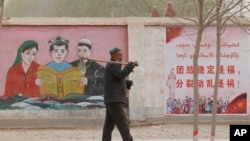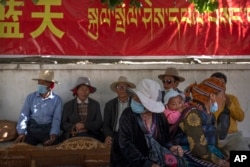A newly released report from the United Nations’ International Labor Organization states that authorities in China are not only using "vocational skills training and education centers" for forced labor in Xinjiang and Tibet, but also the large-scale transfer of "surplus" rural workers to state-led labor programs across the country.
China called the report “baseless” and “false.”
Released Monday, the ILO report details how Chinese authorities have intensified efforts to investigate and monitor poverty levels, setting higher targets for cross-provincial labor transfers while pressuring ethnic smallholder farmers to cede their land to large state-led cooperatives.
Framed as "liberating" rural workers, the report said, this process has forced tens of thousands of Uyghurs, Tibetans and other ethnic minorities in Xinjiang and Tibet into industries such as solar panel production, battery manufacturing, seasonal agriculture and seafood processing under coercive conditions.
The Xinjiang Uyghur Autonomous Region and the Tibet Autonomous Region are two of China’s five provincial-level autonomous regions. Both are located in the country's western regions.
Two systems
Adrian Zenz, a senior fellow in China studies at the Victims of Communism Memorial Foundation, described the report as “very up to date” in its assessment of forced labor practices.
“The new report not only corrected previous conceptual errors [the 2022 version], but is very up to date in its assessment,” Zenz told VOA in an emailed response Wednesday. “ILO attributed all forced labor in Xinjiang to the internment camps” in its previous report.
Zenz noted that in February 2022, an ILO report cited observations by the International Trade Union Confederation, or ITUC, on forced labor in Xinjiang but inaccurately suggested that the region’s entire system of coercive labor was based solely on “internment or ‘re-education’ camps,” or what Beijing calls vocational skills training and education centers, or VSTECs.
The ILO’s latest report cites allegations from the ITUC regarding two major coercive labor systems operating in Xinjiang.
The first involves the mass arbitrary detention of Uyghurs and other ethnic minorities in VSTECs, which have since transitioned to long-term imprisonment in regular prisons.
Released detainees from the centers, according to the report, are often subjected to forced labor in industries such as textiles and electronics.
The second system, as detailed by the report, involves the mass transfer of "surplus" rural workers into state-led labor programs, moving them away from traditional livelihoods into industries such as solar panel production, battery manufacturing, seasonal agriculture and seafood processing.
“In recent years, based on an intensified campaign of investigating and monitoring the poverty status of millions of rural households, the authorities had raised targets leading to increased cross-provincial labor transfers,” the report states. “At the same time, local authorities had ‘actively guided’ ethnic smallholder farmers to transfer their agricultural plots to large state-led cooperatives, thus ‘liberating’ ‘surplus’ rural workers for transfer into manufacturing or the service sector.”
Coercive labor transfers in Tibet
The ILO report also highlights concerns over government-mandated labor transfers of Tibetans.
“These policies would apply coercive methods such as military-style vocational training methods and the involvement of political cadres to have Tibetan nomads and farmers swap their traditional livelihoods for jobs providing measurable cash income in industries such as road construction, mining, or food processing, thereby diluting ‘the negative influence of religion,’” the report said.
The ITUC estimates that labor transfers in Tibet have increased significantly, affecting as many as 630,000 workers in 2024. Incentives for local labor brokers and companies have contributed to this rise, reinforcing concerns that Tibetans are being forcibly removed from their ancestral lands and cultural traditions.
International response
In recent years, human rights organizations, government bodies and U.N. agencies have repeatedly called for accountability and transparency regarding labor conditions in Xinjiang and Tibet, urging countries and international companies to reassess their ties to supply chains linked to these regions.
The United States has taken a strong stance against Uyghur forced labor with the Uyghur Forced Labor Prevention Act, which took effect in 2022. The law bans imports from Xinjiang unless companies can prove they were not made with forced labor, operating on a "rebuttable presumption" that all goods from the region are tainted by forced labor.
Additionally, the U.S. has imposed sanctions and export controls on Chinese entities linked to forced labor, reinforcing its commitment to human rights and ethical trade while pressuring Beijing to end coercive labor programs.
While China has maintained that its policies are aimed at poverty alleviation and economic development, the ILO findings reinforce concerns that these initiatives are mechanisms of repression and control.
The ILO Committee of Experts has formally requested China to provide detailed explanations and clarify the measures it has taken to address these allegations. The report concludes by urging Beijing to amend national and regional policies to ensure that ethnic and religious minorities are not subjected to forced labor under the guise of employment and deradicalization programs.
China’s response
Liu Pengyu, spokesperson at the Chinese Embassy in Washington, dismissed the ILO report as “baseless” and labeled the information as “false,” aimed at attempting to “deceive the international community and disrupt the stable development” of Xinjiang and Tibet.
“Some forces keep spreading lies that there are 'forced labor' in Xinjiang and Xizang. The aim is only to smear China's image, denigrate the Chinese government's policies governing Xinjiang and Xizang [Chinese spelling of Tibet], interfere in China's internal affairs, and attempt to deceive the international community and disrupt the stable development of Xinjiang and Xizang,” Liu told VOA in an emailed response late Tuesday.





